Mirèio un bèu morning cantavo
M. Gounod that the escoutavo
Aprenguè sa cansoun de cor.
E desempièi canton of agreement
Mireille one fine morning sang
Mr. Gounod listened to him
Memorized her song
And since then they sing alright
F. Mistral |
|
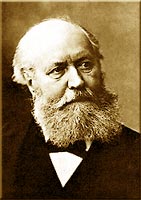 Charles GOUNOD
Charles GOUNOD
1818-1893 |
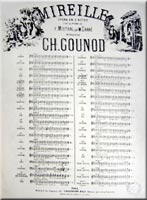 |
… / …
We can see in Jules Charles-Roux’s book how Gounod composed Mireille, we can follow through his letters and his notebooks the idea and the genesis of his opera.
It was at the beginning of 1863 that he had the idea; he immediately submitted it to Mistral. How could he not have been flattered by the choice made of his work by an already illustrious musician? He gave his support to the project even before knowing it and when he learned of Michel Carré’s plan, he approved it immediately and in fact, as stated in the letter that Gounod sent to Mistral on February 17 1863, this plan was nothing but correct and satisfactory; Apologizing for the necessities of the theater for having deleted many episodes from the poem, Gounod added at least:
“The most respectful scruple and the most conscientious fidelity have presided over our work; in our opera there is only Mistral and if we regret not displaying the whole bunch in all its splendor before the public’s eyes, at least not a foreign grain comes to mingle with those we we picked and we tried that they were the most golden. ” |
And to show his goodwill, he asked Mistral to communicate to him popular airs from Provence and especially the airs of farandole. Mistral replied to him, on February 25, 1863, a short and charming letter:
– Dear Sir, I am delighted that you liked my little girl and you only saw her in my verses; but come to Arles, Avignon, Saint-Rémy, come and see her on Sundays when she comes out of vespers and in front of this beauty, this light, this grace, you will understand how easy and charming it is to pick up poetic pages here; that means, Master, that Provence and I are expecting you next April. Your poet, Frédéric a Mistral.
|
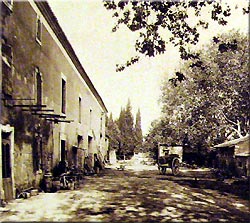
The courtyard of the Judge’s farmhouse
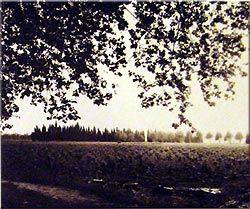
The plain of Maillane
view from the Mistral window at the Mas du Juge
|
Gounod will follow this advice and, dismissing the bizarre idea he had had for a moment of going to settle in Nemi, near Rome, to write his score, he decided to go to Mistral in Maillane at last. On March 18, he wrote from Maillane to his wife:
– I have finally, this beautiful and good Mistral so dreamed, so sought and so desired, Maillane! One day Maillane will mean Mistral as Charmettes or Vevey mean Jean-Jacques. So I arrive in Maillane. I greet this humble little house, the cradle of Mireille. We chat while we prepare lunch; we are eating lunch; Mireille, as you can guess, pays the price for the conversation. I find in Mistral everything I expected, the poet in the ancient shepherd, in the man of nature, in the man of the country and the sky. Mistral offers me a plan that I accept, namely: an excursion after lunch in Saint-Rémy, with plans to sleep there to go tomorrow morning in the mountains to visit the village of Les Baux, one of the main points of Mireille and from where one dominates all Crau until the sea. We leave after lunch, on foot … We cross superb mountains in splendid weather; on the way, I read all my libretto in Mistral! He is moved by it, he cries like a child; he is delighted. At half past four, we arrive in Saint-Rémy …
A quarter of a league away, Roman Antiquities, stone quarries, such a fantastic aspect that one would make a magnificent setting …
And again, a little further:
– The country we have just crossed and where we have just slept is a marvel of savagery, the rocks are one with the ruins of the Middle Ages and feudalism.
I crossed the Vale of Hell yesterday and saw an exit from the Trou des Fées, where Mistral talks about Taven’s stay … From the top of the Baux rocks, you can discover the immense plain of Crau and the Camargue, it is an even vaster panorama than that of the countryside of Rome and of terrible austerity. |
Gounod thought for a moment to stay with Mistral, but the poet’s mother was old and in order not to tire her, he settled in Saint-Rémy, at the Hôtel Ville-Verte, where he came to live on Monday, March 23, guided by the organist of Saint-Rémy, M. Iltis, and under the name of M. Pépin, known as Pépin le Bref, because he speaks little. He will stay there for two months, two months of sweet peace, of work, of pure contemplation in the intoxication of spring. When he leaves Saint-Rémy, his opera will be almost finished. He wrote to his wife to tell her of his ecstasies:
– Half an hour ago, he said, at half past three I left the admirable valley of Saint-Clerc; I have just spent nearly three hours there in an enchanting solitude. Not a creature crossed the valley during those three hours. I stayed there in a little corner of young pine woods in the shade, with my poem, in the middle of all kinds of scents, sometimes holding my breath, the only human noise I heard, to hear better, in bosom of this silence of nature, the mysterious concert of these thousands of small beings who inhabit the air and the ground and whose uninterrupted buzzing trembles in the ear, as the atmosphere trembles in the eyes on a hot day.
You have to read in Gounod’s intimate notebook the notations of his musical ecstasies on the Antiques plateau or in this valley of Saint-Clerc, it is necessary to follow, day by day, the elaboration of this sincere and pure score by which Gounod tried to match Mistral’s poem.
|
That’s not all;
he wants to go to Saintes-Maries;
he will embark in Arles,
on the small Rhône and, the descendant
across the Camargue,
he then walks on foot,
to the church,
the very day of the pilgrimage;
his believer’s soul expands
in this pure Gospel atmosphere
and miraculous: he notes in his notebook:
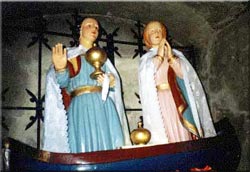
|
– After Vespers. Magnificat. Instant and striking change in appearance! The window of the upper chapel opens as the Magnificat is intoned. Cries of assistance:
– Long live the Saintes Maries!
In an instant, the church is streaming with light, the two altars of the choir, the three galleries, the pilgrim’s nave, each of whom holds a small candle, suddenly shine; Everybody get up; the reliquaries protrude outside the window and descend into the church, by means of two large cables decorated with a quantity of gifts; it is at this moment, and at the end of the Magnificat, that the moving spectacle of this ardent popular confidence begins, a poor mother brings up her sick child to the Saintes and seems as if to assault the table intended to endure for twenty-four hours the reliquaries exposed to the veneration of pilgrims. Nothing can give the idea of what is happening around them then; it is necessary
to have seen and heard it. A father brings his dying son, a son his old paralytic father; we feel everything these poor supplicants feel, we find ourselves transported to the woman of the Gospel saying:
– If I can only touch the fringe of his garment, I will be cured! ”
This is all absurd … or sublime; absurd to peel, sublime to experience! |
He wrote to his wife in the same vein:
– We were delighted with our excursion, the church, the site, the isolation, the curious documents that the priest of the place made available to us and in which I was able to collect some traits of naive poetry and primitive expressions, all of this greatly interested and touched us. Add to that that I had the good fortune to hear mass and to take Communion and you will have the summary of
my impressions from there … It was very helpful to me to see; I have visited and, in a way, felt this terrace of the upper chapel with my feet, the terrace from the top of which the dying Mireille looks down on this admirable sea, the horizon of which seems to her to be the path to heaven; there is in the mixture of this dramatic situation and this aspect a legendary grandeur which moves deeply, it is a beautiful last painting of the last act and when we see these two things at the same time, I assure you that we do not ‘wants to revive Mireille more than among the angels.
We can therefore see what was Gounod’s entire sincerity in composing his opera and his concern for exact documentation; … / …
MIREILLE, MY LOVES …
Extract Chapter V – The Glory of Mireille
Emile Ripert 1930

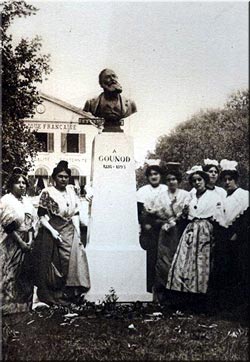
Bust of Gounod in Saint-Rémy
|









